- Home
- Louisa May Alcott
The Annotated Little Women Page 9
The Annotated Little Women Read online
Page 9
The clock struck six; and, having swept up the hearth, Beth put a pair of slippers down to warm. Somehow the sight of the old shoes had a good effect upon the girls, for mother was coming, and every one brightened to welcome her. Meg stopped lecturing, and lit the lamp, Amy got out of the easy-chair without being asked, and Jo forgot how tired she was as she sat up to hold the slippers nearer to the blaze.
“They are quite worn out; Marmee17 must have a new pair.”
“I thought I’d get her some with my dollar,” said Beth.
“No, I shall!” cried Amy.
“I’m the oldest,” began Meg, but Jo cut in with a decided—
“I’m the man of the family now papa is away, and I shall provide the slippers, for he told me to take special care of mother while he was gone.”
“I’ll tell you what we’ll do,” said Beth; “let’s each get her something for Christmas, and not get anything for ourselves.”
“That’s like you, dear! What will we get?” exclaimed Jo.
Every one thought soberly for a minute; then Meg announced, as if the idea was suggested by the sight of her own pretty hands, “I shall give her a nice pair of gloves.”
“Army shoes, best to be had,” cried Jo.
“Some handkerchiefs, all hemmed,” said Beth.
“I’ll get a little bottle of Cologne; she likes it, and it won’t cost much, so I’ll have some left to buy something for me,” added Amy.
“How will we give the things?” asked Meg.
“Put ’em on the table, and bring her in and see her open the bundles. Don’t you remember how we used to do on our birthdays?” answered Jo.
“I used to be so frightened when it was my turn to sit in the big chair with a crown on, and see you all come marching round to give the presents, with a kiss. I liked the things and the kisses, but it was dreadful to have you sit looking at me while I opened the bundles,” said Beth, who was toasting her face and the bread for tea, at the same time.
“Let Marmee think we are getting things for ourselves, and then surprise her. We must go shopping to-morrow afternoon, Meg; there is lots to do about the play for Christmas night,” said Jo, marching up and down with her hands behind her back, and her nose in the air.
“I don’t mean to act any more after this time; I’m getting too old for such things,” observed Meg, who was as much a child as ever about “dressing up” frolics.
“You won’t stop, I know, as long as you can trail round in a white gown with your hair down, and wear gold-paper jewelry. You are the best actress we’ve got,18 and there’ll be an end of everything if you quit the boards,” said Jo. “We ought to rehearse to-night; come here, Amy, and do the fainting scene, for you are as stiff as a poker in that.”
“I can’t help it; I never saw any one faint, and I don’t choose to make myself all black and blue, tumbling flat as you do. If I can go down easily, I’ll drop; if I can’t, I shall fall into a chair and be graceful; I don’t care if Hugo does come at me with a pistol,” returned Amy, who was not gifted with dramatic power, but was chosen because she was small enough to be borne out shrieking by the hero of the piece.
Jo (Katharine Hepburn) gives an acting lesson to a wooden Amy (Joan Bennett) in the 1933 film. (Photofest)
“Do it this way; clasp your hands so, and stagger across the room, crying frantically, ‘Roderigo! save me! save me!’ ” and away went Jo, with a melodramatic scream which was truly thrilling.
Amy followed, but she poked her hands out stiffly before her, and jerked herself along as if she went by machinery; and her “Ow!” was more suggestive of pins being run into her than of fear and anguish. Jo gave a despairing groan, and Meg laughed outright, while Beth let her bread burn as she watched the fun, with interest.
“It’s no use! do the best you can when the time comes, and if the audience shout, don’t blame me. Come on, Meg.”
Then things went smoothly, for Don Pedro defied the world in a speech of two pages without a single break; Hagar, the witch, chanted an awful incantation over her kettleful of simmering toads, with weird effect; Roderigo rent his chains asunder manfully, and Hugo died in agonies of remorse and arsenic, with a wild “Ha! ha!”
“It’s the best we’ve had yet,” said Meg, as the dead villain sat up and rubbed his elbows.
“I don’t see how you can write and act such splendid things, Jo. You’re a regular Shakespeare!” exclaimed Beth, who firmly believed that her sisters were gifted with wonderful genius in all things.
“Not quite,” replied Jo, modestly. “I do think ‘The Witch’s Curse, an Operatic Tragedy,’19 is rather a nice thing; but I’d like to try Macbeth, if we only had a trap-door for Banquo. I always wanted to do the killing part. ‘Is that a dagger that I see before me?’ ”20 muttered Jo, rolling her eyes and clutching at the air, as she had seen a famous tragedian do.
“No, it’s the toasting fork, with ma’s shoe on it instead of the bread. Beth’s stage struck!” cried Meg, and the rehearsal ended in a general burst of laughter.
“Glad to find you so merry, my girls,” said a cheery voice at the door, and actors and audience turned to welcome a stout, motherly lady, with a “can-I-help-you” look about her which was truly delightful. She wasn’t a particularly handsome person, but mothers are always lovely to their children, and the girls thought the gray cloak and unfashionable bonnet covered the most splendid woman in the world.21
“Well, dearies, how have you got on to-day? There was so much to do, getting the boxes ready to go to-morrow, that I didn’t come home to dinner. Has any one called, Beth? How is your cold, Meg? Jo, you look tired to death. Come and kiss me, baby.”
While making these maternal inquiries Mrs. March got her wet things off, her hot slippers on, and sitting down in the easy-chair, drew Amy to her lap, preparing to enjoy the happiest hour of her busy day. The girls flew about, trying to make things comfortable, each in her own way. Meg arranged the tea-table; Jo brought wood and set chairs, dropping, overturning, and clattering everything she touched; Beth trotted to and fro between parlor and kitchen, quiet and busy; while Amy gave directions to every one, as she sat with her hands folded.
As they gathered about the table, Mrs. March said, with a particularly happy face, “I’ve got a treat for you after supper.”
A quick, bright smile went round like a streak of sunshine. Beth clapped her hands, regardless of the hot biscuit she held, and Jo tossed up her napkin, crying, “A letter! a letter! Three cheers for father!”
“Yes, a nice long letter. He is well, and thinks he shall get through the cold season better than we feared. He sends all sorts of loving wishes for Christmas, and an especial message to you girls,” said Mrs. March, patting her pocket as if she had got a treasure there.
“Hurry up, and get done. Don’t stop to quirk your little finger, and prink over your plate, Amy,” cried Jo, choking in her tea, and dropping her bread, butter side down, on the carpet, in her haste to get at the treat.
Beth ate no more, but crept away, to sit in her shadowy corner and brood over the delight to come, till the others were ready.
“I think it was so splendid in father to go as a chaplain22 when he was too old to be drafted, and not strong enough for a soldier,” said Meg, warmly.
“Don’t I wish I could go as a drummer, a vivan—what’s its name?23 or a nurse, so I could be near him and help him,” exclaimed Jo, with a groan.
“It must be very disagreeable to sleep in a tent and eat all sorts of bad-tasting things, and drink out of a tin mug,” sighed Amy.
“When will he come home, Marmee?” asked Beth, with a little quiver in her voice.
“Not for many months, dear, unless he is sick. He will stay and do his work faithfully as long as he can, and we won’t ask for him back a minute sooner than he can be spared. Now come and hear the letter.”
They all drew to the fire, mother in the big chair with Beth at her feet, Meg and Amy perched on either arm of the chair, and Jo leaning on the b
ack, where no one would see any sign of emotion if the letter should happen to be touching.
Very few letters were written in those hard times that were not touching, especially those which fathers sent home. In this one little was said of the hardships endured, the dangers faced, or the homesickness conquered; it was a cheerful, hopeful letter, full of lively descriptions of camp life, marches, and military news; and only at the end did the writer’s heart overflow with fatherly love and longing for the little girls at home.
“Give them all my dear love and a kiss. Tell them I think of them by day, pray for them by night, and find my best comfort in their affection at all times. A year seems very long to wait before I see them, but remind them that while we wait we may all work, so that these hard days need not be wasted. I know they will remember all I said to them, that they will be loving children to you, will do their duty faithfully, fight their bosom enemies bravely, and conquer themselves so beautifully, that when I come back to them I may be fonder and prouder than ever of my little women.”24
Everybody sniffed when they came to that part; Jo wasn’t ashamed of the great tear that dropped off the end of her nose, and Amy never minded the rumpling of her curls as she hid her face on her mother’s shoulder and sobbed out, “I am a selfish pig! but I’ll truly try to be better, so he mayn’t be disappointed in me by and by.”
“We all will!” cried Meg. “I think too much of my looks, and hate to work, but won’t any more, if I can help it.”
“I’ll try and be what he loves to call me, ‘a little woman,’ and not be rough and wild; but do my duty here instead of wanting to be somewhere else,” said Jo, thinking that keeping her temper at home was a much harder task than facing a rebel or two down South.
Beth said nothing, but wiped away her tears with the blue army-sock, and began to knit with all her might, losing no time in doing the duty that lay nearest her, while she resolved in her quiet little soul to be all that father hoped to find her when the year brought round the happy coming home.
The reading of Mr. March’s letter is one of the most frequently rendered scenes from the novel. On this page are, clockwise from top left, May Alcott’s illustration from the first edition and publicity photographs from the 1933, 1949, and 1994 film versions. (All except top left, Photofest)
Mrs. March broke the silence that followed Jo’s words, by saying in her cheery voice, “Do you remember how you used to play Pilgrim’s Progress when you were little things? Nothing delighted you more than to have me tie my piece-bags on your backs for burdens, give you hats and sticks, and rolls of paper, and let you travel through the house from the cellar, which was the City of Destruction, up, up, to the house-top, where you had all the lovely things you could collect to make a Celestial City.”25
“What fun it was, especially going by the lions, fighting Apollyon,26 and passing through the Valley where the hobgoblins were,” said Jo.
“I liked the place where the bundles fell off and tumbled down stairs,” said Meg.
“My favorite part was when we came out on the flat roof where our flowers and arbors, and pretty things were, and all stood and sung for joy up there in the sunshine,” said Beth, smiling, as if that pleasant moment had come back to her.
“I don’t remember much about it, except that I was afraid of the cellar and the dark entry, and always liked the cake and milk we had up at the top. If I wasn’t too old for such things, I’d rather like to play it over again,” said Amy, who began to talk of renouncing childish things at the mature age of twelve.
“We never are too old for this, my dear, because it is a play we are playing all the time in one way or another. Our burdens are here, our road is before us, and the longing for goodness and happiness is the guide that leads us through many troubles and mistakes to the peace which is a true Celestial City. Now, my little pilgrims, suppose you begin again, not in play, but in earnest, and see how far on you can get before father comes home.”27
“Really, mother? where are our bundles?” asked Amy, who was a very literal young lady.
“Each of you told what your burden was just now, except Beth; I rather think she hasn’t got any,” said her mother.
“Yes, I have; mine is dishes and dusters, and envying girls with nice pianos, and being afraid of people.”
Beth’s bundle was such a funny one that everybody wanted to laugh; but nobody did, for it would have hurt her feelings very much.
“Let us do it,” said Meg, thoughtfully. “It is only another name for trying to be good, and the story may help us; for though we do want to be good, it’s hard work, and we forget, and don’t do our best.”
“We were in the Slough of Despond28 to-night, and mother came and pulled us out as Help did in the book. We ought to have our roll of directions, like Christian. What shall we do about that?” asked Jo, delighted with the fancy which lent a little romance to the very dull task of doing her duty.
“Look under your pillows, Christmas morning, and you will find your guide-book,” replied Mrs. March.
They talked over the new plan while old Hannah cleared the table; then out came the four little work-baskets, and the needles flew as the girls made sheets for Aunt March.29 It was uninteresting sewing, but tonight no one grumbled. They adopted Jo’s plan of dividing the long seams into four parts, and calling the quarters Europe, Asia, Africa and America, and in that way got on capitally, especially when they talked about the different countries as they stitched their way through them.30
At nine they stopped work, and sung, as usual, before they went to bed. No one but Beth could get much music out of the old piano; but she had a way of softly touching the yellow keys, and making a pleasant accompaniment to the simple songs they sung. Meg had a voice like a flute, and she and her mother led the little choir. Amy chirped like a cricket, and Jo wandered through the airs at her own sweet will, always coming out at the wrong place with a croak or a quaver that spoilt the most pensive tune. They had always done this from the time they could lisp
“Crinkle, crinkle, ’ittle ’tar,”31
Alcott’s mother Abigail used this workbasket and was warmed by the shawl draped over the chair to the left, both in the Orchard House collection. (Photograph by James E. Coutré)
and it had become a household custom, for the mother was a born singer. The first sound in the morning was her voice, as she went about the house singing like a lark; and the last sound at night was the same cheery sound, for the girls never grew too old for that familiar lullaby.
1. Playing Pilgrims. Having already linked her story to Bunyan in her epigraph, Alcott extends the link to The Pilgrim’s Progress with this chapter title. At this point, however, the girls’ pilgrimage is treated only as a game.
2. said Beth, contentedly. Louisa May Alcott (1832–88) modeled the four March sisters closely on her three siblings and herself. Meg was based on Anna Bronson Alcott (1831–93); Jo was patterned on Alcott herself; Beth corresponds to Alcott’s younger sister Elizabeth Sewall (“Lizzie”) Alcott (1835–58); and Amy was inspired by youngest sister Abigail May Alcott (1840–79), known in the family as May. It has been suggested, though not proven, that Alcott chose the name “March” for her fictional family because it was a month name, like her mother’s maiden name, “May.” The opening speech of each of the March sisters supplies a keynote to her character. Jo, in her unladylike position on the rug, gives a hint of her tendency to be disagreeable. Her inability to separate Christmas from its worldly aspects positions her between the realms of charity and materialism—both of which will lay claim to her. Meg, who must contend with vanity, thinks only in terms of her need to feel fashionable. Amy’s attitude is subtly different, rooted more broadly in her notions of status and in feelings of injustice and self-pity. While Beth’s happy resignation reflects her loving nature, her position in the corner hints at her shyness and timidity.
3. where the fighting was. Though not made explicit here, the time is December 1861, the first winter of the Civil Wa
r. Alcott’s actual father, Bronson Alcott, was sixty-one when the war began and took no part in the fighting.
4. “Undine and Sintram.” Undine is a novella-length fairy tale by the German romantic author Friedrich de la Motte Fouqué (1777–1843). The heroine, a water sprite, evinces some of the same stormy temper and appetite for mischief that characterize Jo, as well as the young real-life Louisa. Undine marries a German knight in hopes of learning self-restraint and gaining a human soul. Parallels to the romance between Jo and Professor Bhaer later in Little Women are intriguing but perhaps coincidental. In the popular 1845 American edition, the story of Undine was paired with another of Fouqué’s works, “Sintram and His Companions: A Northern Tale.”
5. said Amy, decidedly. With one exception, the second round of speeches by the girls links each to her signal talent. Jo is identified with literature, Beth with music, and Amy with visual art. These talents correspond respectively with the real-life gifts of the three youngest Alcott sisters: Louisa was, of course, the most literary sister; Lizzie was “very faithful to her music” (A. Bronson Alcott, Letters, p. 144), and May settled early on a career in the visual arts. Alcott will note Meg’s acting ability a few pages later. Anna, Meg’s real-life counterpart, was likewise a gifted actress. Amy’s attraction to Faber pencils foreshadows her love of extravagance, as these pencils were among the finest available. May Alcott was given a set of Faber pencils for Christmas in 1853 (Manuscript journal, Houghton Library, Harvard University, bMS Am 1817[56]).

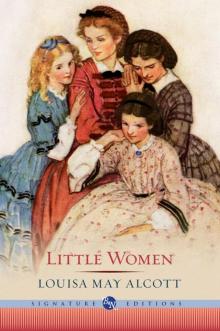 Little Women
Little Women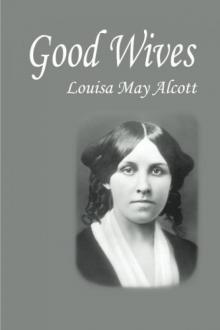 Good Wives
Good Wives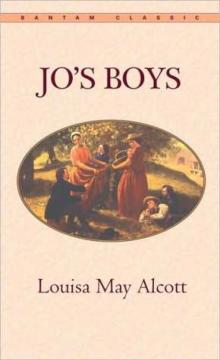 Jo's Boys
Jo's Boys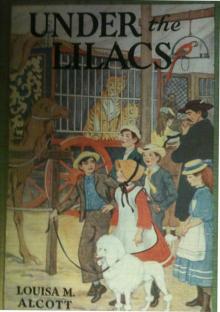 Under the Lilacs
Under the Lilacs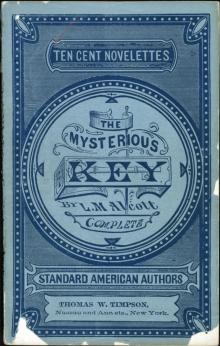 The Mysterious Key and What It Opened
The Mysterious Key and What It Opened The Inheritance
The Inheritance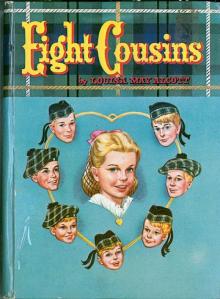 Eight Cousins
Eight Cousins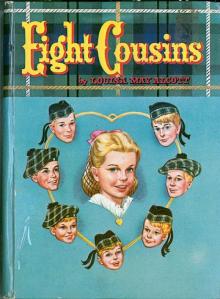 Eight Cousins; Or, The Aunt-Hill
Eight Cousins; Or, The Aunt-Hill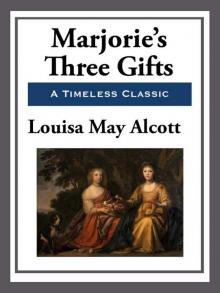 Marjorie's Three Gifts
Marjorie's Three Gifts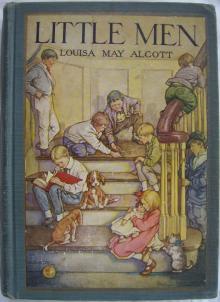 Little Men
Little Men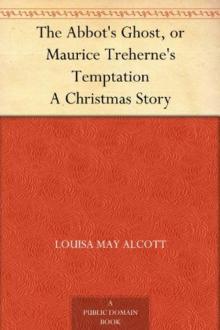 The Abbot's Ghost, or Maurice Treherne's Temptation: A Christmas Story
The Abbot's Ghost, or Maurice Treherne's Temptation: A Christmas Story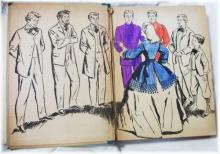 Rose in Bloom
Rose in Bloom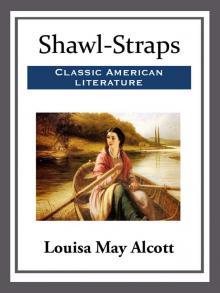 Shawl-Straps
Shawl-Straps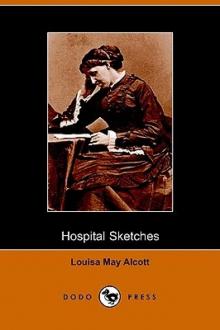 Hospital Sketches
Hospital Sketches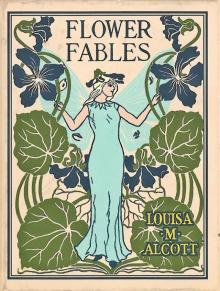 Flower Fables
Flower Fables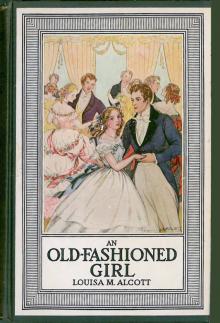 An Old-Fashioned Girl
An Old-Fashioned Girl The Candy Country
The Candy Country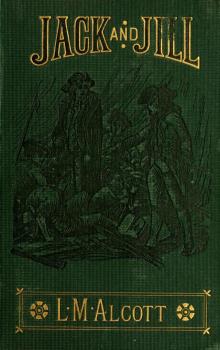 Jack and Jill
Jack and Jill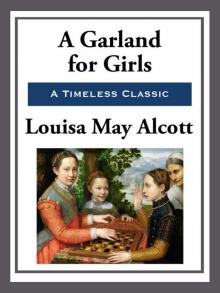 A Garland for Girls
A Garland for Girls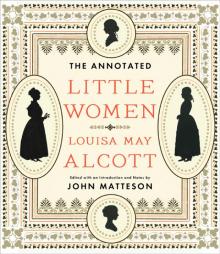 The Annotated Little Women
The Annotated Little Women A Classic Christmas
A Classic Christmas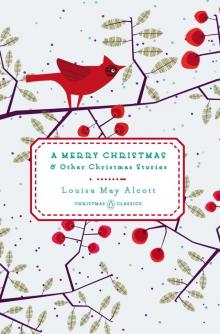 A Merry Christmas
A Merry Christmas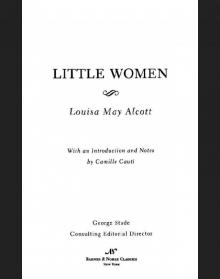 Little Women (Barnes & Noble Classics Series)
Little Women (Barnes & Noble Classics Series)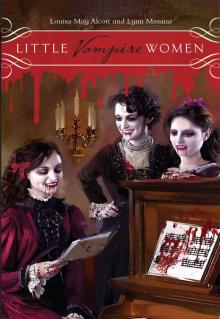 Little Vampire Women
Little Vampire Women